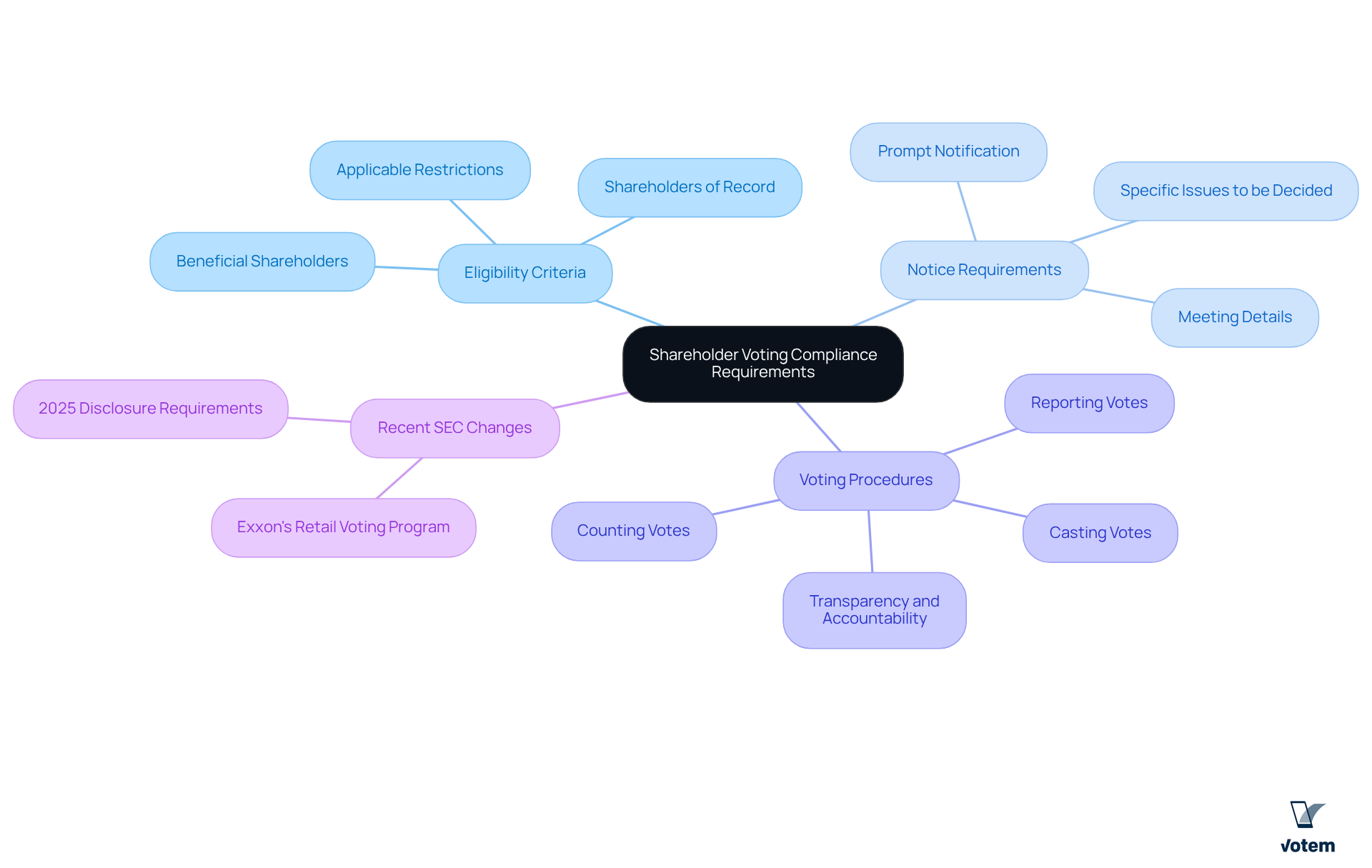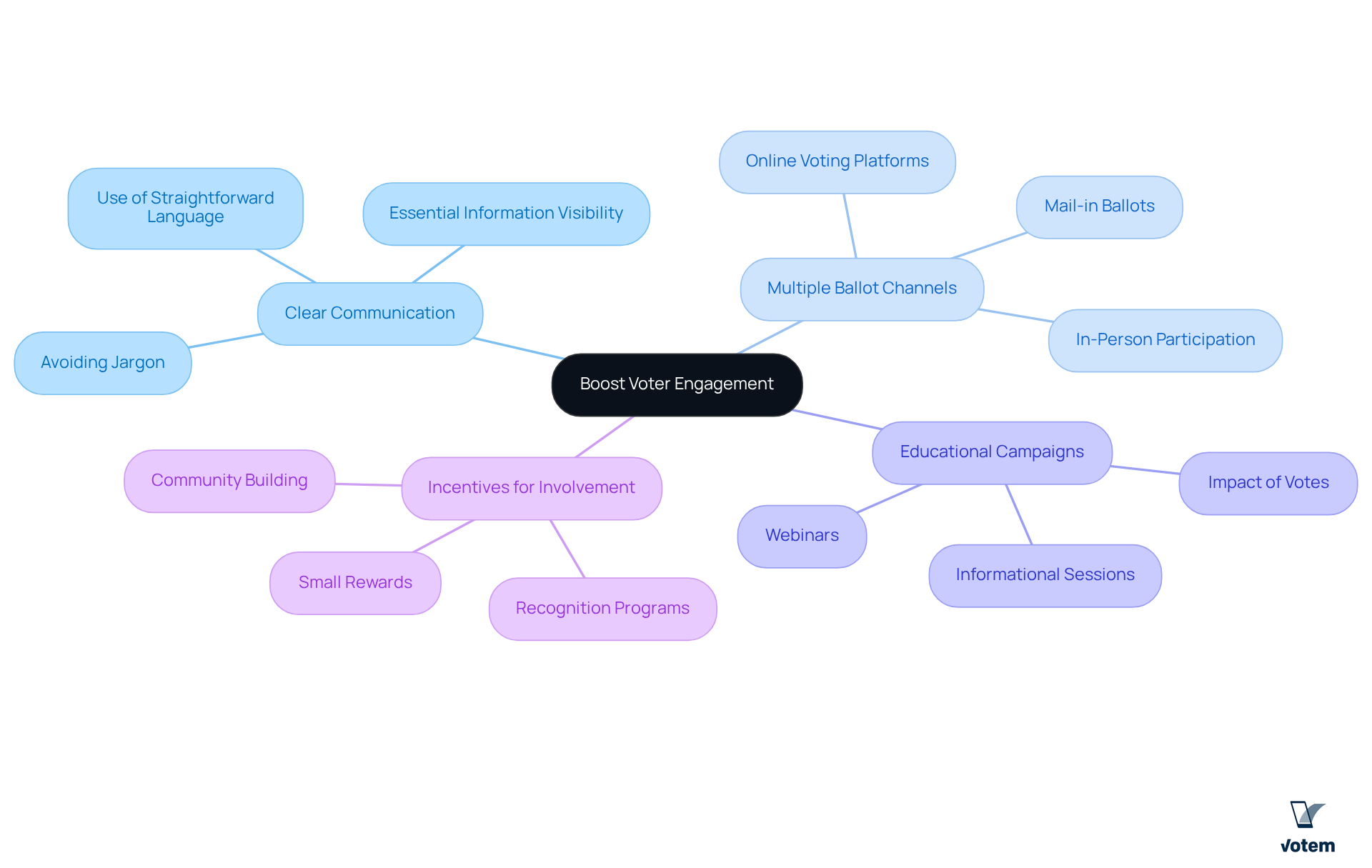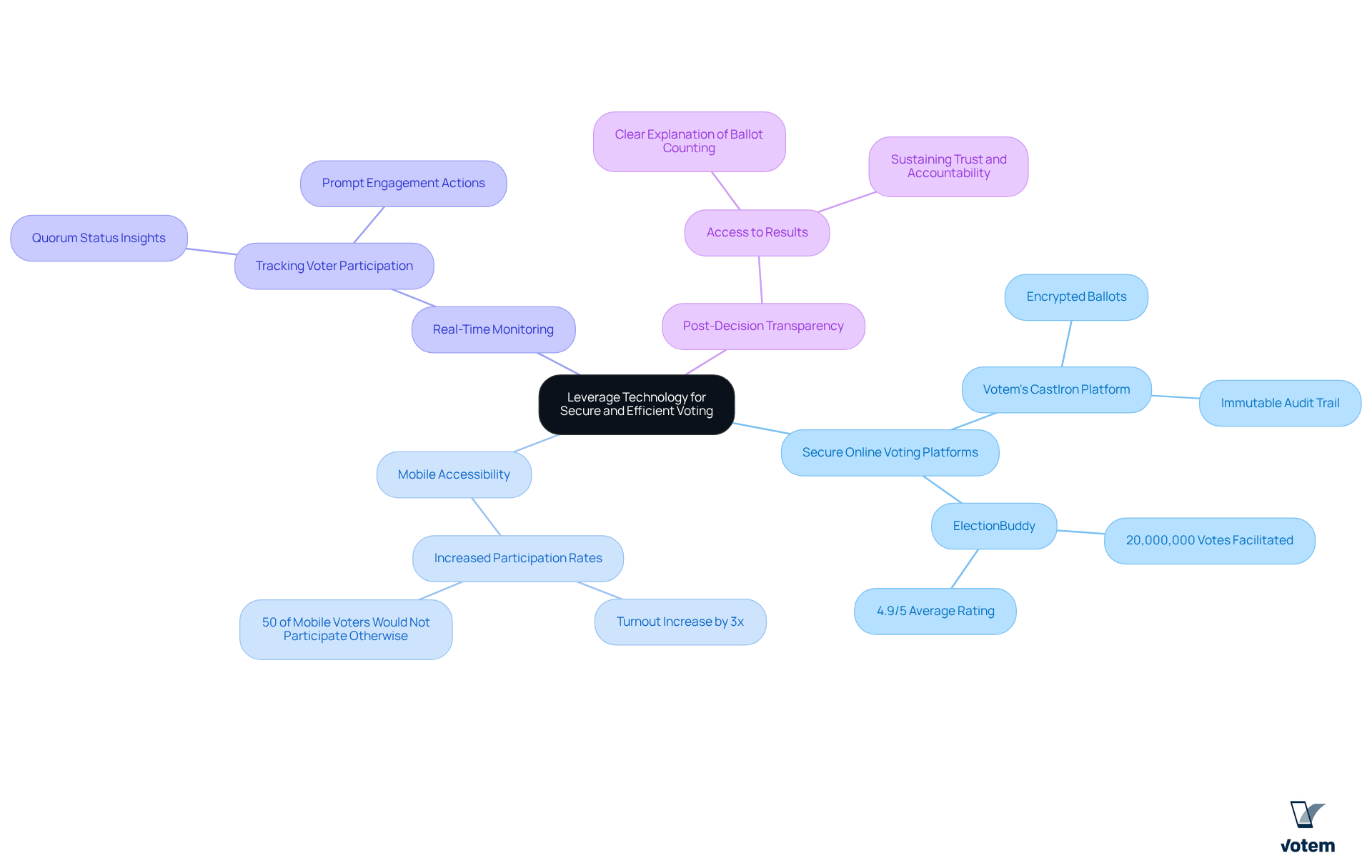Overview
This article delineates three best practices essential for ensuring effective shareholder voting compliance:
- Comprehending compliance requirements
- Implementing strategies to enhance voter engagement
- Leveraging technology for secure voting
These practices underscore the significance of clear communication, accessibility, and technological solutions. Collectively, they not only enhance participation and trust in the voting process but also align with regulatory standards and stakeholder expectations. By embracing these practices, union leadership can foster a more engaged and compliant voting environment.
Introduction
Navigating the complexities of shareholder voting compliance is crucial for organizations aiming to foster trust and engagement among their stakeholders. With evolving regulations set to take effect in 2025, understanding the intricacies of eligibility, notice requirements, and voting procedures becomes paramount.
How can companies not only meet these compliance standards but also enhance voter participation and confidence in the process? This article explores best practices that leverage clear communication, innovative technology, and strategic engagement to transform shareholder voting into a more accessible and trustworthy endeavor.
Understand Shareholder Voting Compliance Requirements
To ensure effective , organizations must thoroughly understand the regulations governing their operations. This includes familiarizing themselves with the requirements established by the Securities and Exchange Commission (SEC), state laws, and any industry-specific regulations. Key aspects to consider include eligibility criteria, notice requirements, and procedures for shareholder voting.
- Eligibility Criteria: Clearly define who is eligible to vote, encompassing both shareholders of record and beneficial shareholders, while noting any applicable restrictions.
- Notice Requirements: Ensure that all stockholders receive prompt and thorough notification regarding the election, including details about the meeting and the specific issues to be decided.
- Voting Procedures: Implement transparent procedures for shareholder voting, ensuring that the processes of casting, counting, and reporting votes are accurate and accountable.
By thoroughly grasping these requirements, entities can reduce risks related to non-compliance and cultivate trust among their stakeholders. Recent modifications in SEC regulations, especially those taking effect in 2025, highlight the necessity for companies to reveal their election policies and guarantee that all stakeholders are sufficiently informed and involved in the shareholder voting process.
For instance, Exxon’s Retail Balloting Program illustrates how companies can boost involvement by streamlining the election procedure for retail investors, thus aligning their choices with board suggestions effectively. This proactive approach not only meets compliance standards but also enhances investor confidence.

Implement Strategies to Boost Voter Engagement
To enhance , organizations must implement effective strategies that resonate with stakeholders.
- Clear Communication: It is imperative to utilize straightforward language in all communications related to the voting process. By avoiding jargon, organizations ensure that all stakeholders grasp the issues at hand, fostering a more informed electorate.
- Multiple Ballot Channels: Providing various methods for casting ballots—including online platforms, mail-in ballots, and in-person participation—accommodates diverse preferences. This flexibility enhances accessibility for all stakeholders, ensuring that everyone has the opportunity to participate.
- Educational Campaigns: Organizing informational sessions or webinars serves to inform investors about the election method and underscores the significance of their involvement. Emphasizing how their votes can impact the group’s direction is crucial in encouraging increased participation.
- Incentives for Involvement: Implementing recognition programs or small rewards can significantly encourage stakeholder engagement in the election. Such incentives cultivate a sense of community and appreciation among participants, reinforcing their commitment to the process.
By actively advocating these engagement strategies, organizations can significantly boost participation and ensure that shareholder voting accurately reflects the collective will of their shareholders.

Leverage Technology for Secure and Efficient Voting
Incorporating technology into the election process can significantly enhance security and efficiency. Organizations should consider the following best practices:
- Secure Online Voting Platforms: Utilize platforms like Votem’s patented CastIron, which offer secure, compliant online voting solutions that encrypt ballots and provide an immutable audit trail. This guarantees that each vote is safeguarded and can be verified, promoting confidence among stakeholders.
- Mobile Accessibility: Ensure that the platform is mobile-friendly, allowing stakeholders to participate conveniently from their devices. Mobile balloting can elevate participation rates dramatically; reports indicate that turnout can increase by up to three times on launch day. Approximately half of the voters using mobile options would not have participated otherwise, underscoring the critical role of accessibility in enhancing voter engagement.
- Real-Time Monitoring: Implement tools that allow for real-time tracking of voter participation and quorum status. This ability not only assists in overseeing the ballot system efficiently but also offers , allowing for timely actions if needed.
- Post-Decision Transparency: Following the election, grant stakeholders access to results and a clear explanation of how ballots were counted and verified. Clarity in the electoral system is crucial for sustaining trust and accountability.
By leveraging technology, particularly Votem’s innovative solutions, organizations can not only comply with regulations but also enhance the overall experience of shareholder voting. This approach ultimately strengthens democratic processes within their organizations. Testimonials from satisfied clients further illustrate the effectiveness of Votem’s platform in increasing voter turnout and engagement.

Conclusion
Understanding and implementing effective practices for shareholder voting compliance is essential for organizations aiming to foster transparency and trust among their stakeholders. By grasping the intricacies of compliance requirements, enhancing voter engagement, and leveraging technology, companies can create a more inclusive and efficient voting process that reflects the collective interests of their shareholders.
Key arguments presented in this article emphasize the importance of:
- Understanding eligibility criteria
- Notice requirements
- Transparent voting procedures
These are foundational elements of compliance. Furthermore, strategies such as:
- Clear communication
- Multiple voting channels
- Educational campaigns
- Incentives for participation
Significantly contribute to boosting voter engagement. The integration of secure online voting platforms further enhances the voting experience, ensuring that the process is both efficient and trustworthy.
Ultimately, the significance of these best practices cannot be overstated. As regulations evolve and shareholder expectations rise, organizations must prioritize compliance and engagement to maintain strong relationships with their investors. By adopting these strategies, companies not only comply with current regulations but also empower their stakeholders to take an active role in shaping the future of the organization. Embracing these practices will lead to a more democratic and participatory corporate environment, vital for long-term success and sustainability.
Frequently Asked Questions
What are the main compliance requirements for shareholder voting?
Organizations must understand regulations from the Securities and Exchange Commission (SEC), state laws, and industry-specific regulations, focusing on eligibility criteria, notice requirements, and voting procedures.
Who is eligible to vote in shareholder elections?
Eligibility includes both shareholders of record and beneficial shareholders, along with any applicable restrictions that may apply.
What are notice requirements for shareholder voting?
Stockholders must receive prompt and thorough notifications about the election, including details regarding the meeting and specific issues to be decided.
What should be included in voting procedures for shareholders?
Voting procedures should be transparent, ensuring accurate and accountable processes for casting, counting, and reporting votes.
Why is it important to understand shareholder voting compliance requirements?
Understanding these requirements helps reduce risks related to non-compliance and builds trust among stakeholders.
What recent changes in SEC regulations should companies be aware of?
Recent modifications in SEC regulations, effective in 2025, require companies to disclose their election policies and ensure stakeholders are informed and involved in the voting process.
How can companies enhance shareholder participation in voting?
Companies can streamline the election process for retail investors, as demonstrated by Exxon’s Retail Balloting Program, which aligns investor choices with board recommendations and boosts participation.
List of Sources
- Understand Shareholder Voting Compliance Requirements
- SEC Staff Adopts Significant New Guidance Affecting Shareholder Proposals and Engagement // Cooley // Global Law Firm (https://cooley.com/news/insight/2025/2025-02-14-sec-staff-adopts-significant-new-guidance-affecting-shareholder-proposals-and-engagement)
- Key Considerations for the 2025 Annual Reporting and Proxy Season Part II: Proxy Statements | White & Case LLP (https://whitecase.com/insight-alert/key-considerations-2025-annual-reporting-and-proxy-season-part-ii-proxy-statements)
- Securities Law / Investment Funds Advisory | Implications of the SEC’s Approval of a New Retail Shareholder Voting Program | News & Insights | Alston & Bird (https://alston.com/en/insights/publications/2025/09/sec-approval-retail-shareholder-voting-program)
- Preparing for the 2025 Proxy and Annual Reporting Season – Harter Secrest & Emery LLP (https://hselaw.com/news-and-information/legalcurrents/preparing-for-the-2025-proxy-and-annual-reporting-season)
- Implement Strategies to Boost Voter Engagement
- 15 Inspirational Quotes to Get You Excited About Voting (https://globalcitizen.org/en/content/voting-quotes-inspirational)
- Global Investment Bank and Financial Services | Citi (https://citigroup.com/global/news/press-release/2024/proxymity-launches-vote-connect-global-with-citi-securities-services)
- How to Boost Voter Turnout & Member Engagement in Your Next Election – AssociationVoting (https://associationvoting.com/how-to-boost-voter-turnout-member-engagement-in-your-next-election)
- Optimizing Shareholder Communication & Engagement (https://dfinsolutions.com/knowledge-hub/thought-leadership/knowledge-resources/how-to-improve-shareholder-communication-and-engagement)
- Leverage Technology for Secure and Efficient Voting
- 9 Free Online Voting Tools for Engaging Union Members | Online Voting with Votem® (https://votem.com/9-free-online-voting-tools-for-engaging-union-members)
- Voting Online, Simplified with ElectionBuddy – ElectionBuddy (https://electionbuddy.com)
- Online Voting System | Simply Voting (https://simplyvoting.com)
- eBallot | Secure Online Voting Platform & Election Software (https://eballot.com)
- Ballot Bliss, LLC Introduces Online Voting Solution Designed for Security and Efficiency (https://cbs42.com/business/press-releases/ein-presswire/797284087/ballot-bliss-llc-introduces-online-voting-solution-designed-for-security-and-efficiency)

